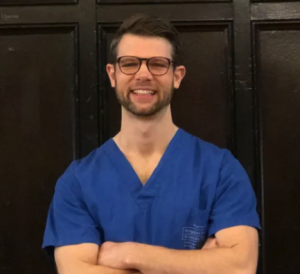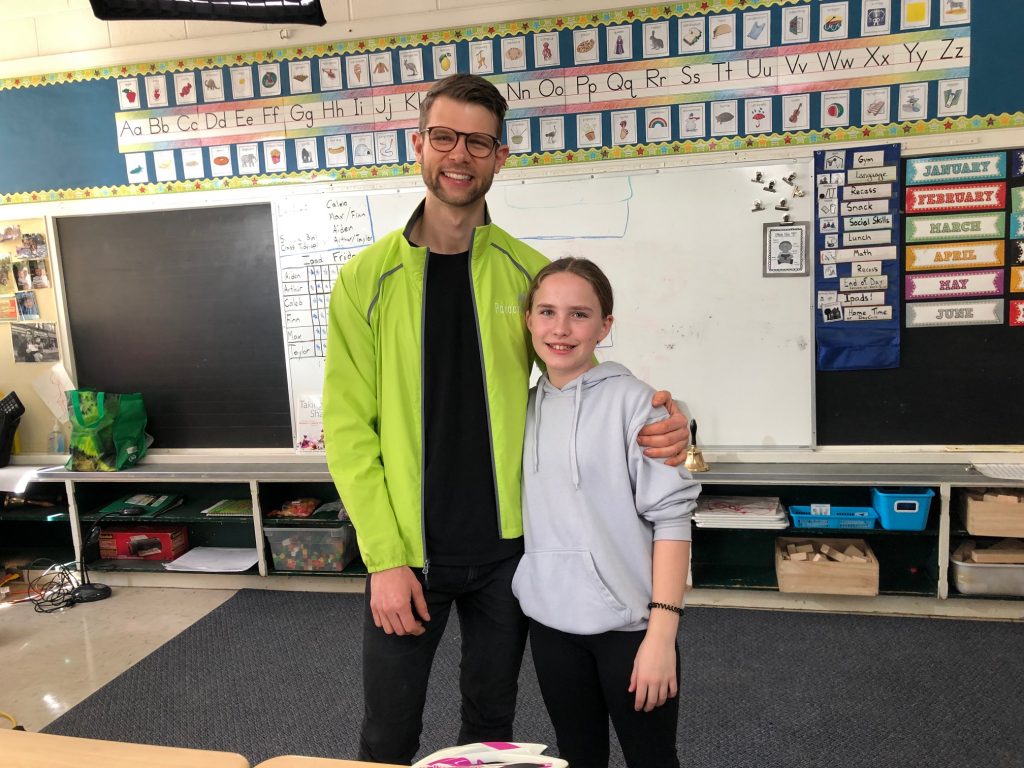
Brain Waves alumnus at frontlines of pandemic response
This page was last reviewed on April 20, 2020
By Kelley Teahen, Parachute Vice President, Communications and Marketing.
Dr. Gray Moonen, 31, has become famous in Canada for his #FacesFightingCovid campaign. As a resident physician at the University of Toronto, he’s taking photos and sharing stories of all hospital workers helping patients infected with COVID-19.
But he would never have ended up on this medical journey, he says, without Parachute’s Brain Waves program.
“I had entered psychology at University of Toronto and didn’t study science at high school – I was a jock growing up,” he says. “I was always impressed by doctors: they worked hard, they were smart, they sacrificed a lot, they got their hands dirty. But I didn’t see myself being able to achieve that.”
One day, someone came to one of Moonen’s classes, looking for volunteers for Parachute’s half-day neuroscience program for children from Grades 4 to 6, where the emphasis is on teaching how important it is to protect your brain from injury because of all the things the brain controls in our body and senses. He signed up and found himself becoming friends with his fellow volunteers, many of whom were students in pre-med programs and “incredibly smart.” He started to take science courses at university, which were a challenge without having taken those courses in high school. “I put a lot more effort into them and discovered, maybe I can actually do this.”
From his first time volunteering in the classroom for what was then called “Brain Day”, Moonen felt he had found his home. “I was teaching kids who were super-impressionable, and high risk for these catastrophic issues. The value that provides was amazing. Brain Day was incredibly formative for me.”

Moonen went on to become the site co-ordinator for the Brain Waves volunteers based in Toronto during a time when the program grew from providing 50 to 350 presentations in a year. “Brain Waves showed me what an impact you can make in the community, the value you can provide to people in the community whether through advocacy, education, as a connector or leader. The program made me want to do medicine, where you have a platform to positively influence people.”
As well, he says, managing the large program developed his organizational, managerial and communication skills, both “through things that worked and things that didn’t work. It was like doing an MBA and undergrad all in one.” He put these skills to work again as president of the Aesculapian Society for medical students at at Queen’s University in Kingston, Ontario, where he did his medical degree.
Prior to that, Moonen did a master’s degree in neuroscience at U of T, supervised by neurosurgeon Dr. Charles Tator, one of the co-founders of Parachute and a co-founder of Brain Waves, who Moonen met as a program volunteer. The two became close and, in 2013, when Dr. Tator was asked to make a television appearance to support Parachute and Brain Waves, he invited Moonen to be his assistant.
“This was for Battle of the Blades, and Parachute was the charity recipient for NHLer Grant Marshall”, he recalls: the CBC TV show paired hockey players with professional figure skaters, and each pair created skating routines and competed for top place, with the eventual winners earning money for their chosen charity. A film crew captured Tator and Moonen presenting Brain Waves to a group of elementary school students. “It was very memorable, seeing Charles in his element,” Moonen says. “He’s such a charismatic guy, he’s so good with kids, and it was very full circle seeing him do the presentation.”
Moonen volunteered once again for Brain Waves in 2019 when Parachute created a series of training videos, dubbed “Train for the Brain”, to demonstrate how to properly do Brain Waves activities, from helmet fitting to taste bud mapping.
“Kids are so fascinated by this stuff because you’re engaging them and teaching them this important information, he says. “If you deliver the information well, and Parachute sets up volunteers well to do that, you have a big positive impact on these kids.”
In Moonen’s experience, “every kid has a story about someone getting a head injury playing sports. It affects everybody. When (hockey player) Sidney Crosby got his injury (a concussion in 2011), kids talked about it. It was an important learning point. You can have a concussion, even if you aren’t hit hard. People aren’t pretending when they’re injured.”
Moonen has one year left in his residency program and plans on pursuing academic medicine, involved in research or teaching. He doesn’t see being a trainee in this pandemic time to be a curse, but rather, a blessing: “We’re trained to do this stuff, emergency care, acute care, we’re adaptable as doctors, we’re able to meet the challenge and step up.
“It’s a privilege to train right now. We’re all, as residents, developing leadership skills. We’re all developing better communications skills. We’re advocating for what’s right and what’s not right. We’re learning along with our supervisors, our staff doctors. We’re all in this together.”